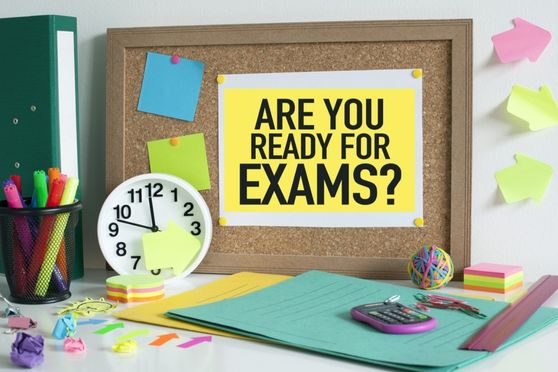ICSE Preparation Tips: Expert advice from Ms Manisha Ajmera


The onset of spring usually also brings with it the exam season. Every adult who has been through this knows what this time of the year makes you feel like. Amidst the constant dilemma of whether to keep the fan speed on low or switched off, the students must also stay focused on their books and go through the most stressful phase of the year.
To make this difficult time as easy as possible, we at Edugraph have come up with our ICSE Preparation Tips series to help students who are appearing for the class 10 board exams. In this series we bring you expert insights on the papers, what to expect, how to study, how to revise and paper structures - from a host of teachers from renowned schools across the city.
Today we have Ms Manisha Ajmera, Senior Teacher of Legal Studies and Accounts from The Future Foundation School, Kolkata share with us her invaluable insights. Read on to find out what she has to say…

They say that accomplishing anything requires a combination of inspiration and perspiration. This means that you need to work hard and work smart. This philosophy applies to any job, and equally to doing well on your high school or college exams.
Studying is about finding a right balance between concentration, understanding, retention, and rest. For many students the biggest problem with exams is a lack of confidence, or what some people might call “test anxiety”.
So, here are a few study tips that will help anyone to prepare well for examination.
1. CREATE A STUDY PLAN AND STICK TO IT– Before sitting down to pick up a book and start studying, create a study plan. List down the name of the subjects and topics, sort out the priorities of studying each subject, chart out number of days before the exam and assign to each subject strategically. To learn faster spread out your study time for each subject. It will help you to stay focused than to deep dive into one or two subjects.
One of the biggest challenges in following your study schedule is that you’ll be tempted to blow it off and instead do something relaxing, fun, or entertaining. However, you need to resist this temptation and instead make the most of your scheduled time. Reward yourself when you adhere to the study plan with a short break.
2. ORGANISE THE STUDY SPACE – We are able to focus and study at our best when we are in a pleasant and comfortable environment. Find the best spot in the house or room where there is better light, fresh air and
is silent. De-clutter the space from unnecessary items as much as possible to avoid distractions. Turn off the mobile phone or keep in flight mode while studying. Do not lie down and study.
3. TAKE REGULAR BREAKS– Human brain functions the best when it is given breaks periodically. Researchers have proven that studying for short intervals with regular breaks are more efficient than doing it for long hours without breaks. Forcing ourselves to study when our mind is sleepy or not active can only make it more exhausted. So, take breaks regularly, go for a brief walk, close your eyes or look away in distance to rest the eyes and the mind. Take 10 deep breathes at intervals.
4. FOLLOW A HEALTHY DIET – Good food habit always results in better health, thus more energy. Avoid eating unhealthy foods, instead increase the intake of fresh and nutritious foods to avoid unnatural sleepiness, fatigue or sickness. Drink 6-8 glasses of water everyday to keep yourself well hydrated.
5. MAINTAIN A PROPER SLEEP ROUTINE – During sleep human mind and body rest completely to regain energy and strength by completing the daily metabolism cycle. A good sleep of 8 hours is recommended by health experts. Some people may prefer to study late at night, some may prefer early in the morning, so check which time of the day suits best, schedule and maintain a proper sleep routine.
6. TAKE HELP OF YOUR TEACHERS- Teachers are the powerhouse of knowledge. Share your study plan with them and get their inputs. Do not hesitate to take their help for better understanding, doubt clearance and revision. Find out which are the utmost important topics, request them to conduct mock tests for you.
7. READ ENTIRETY & MAKE BRIEF NOTES – Thorough reading is a must for learning any subject entirely. Making brief notes while studying increases the recall capacity for our brain to remember what we have already studied by improving the flow of our study process. Practice application-based problems every day.
8. GO THROUGH PREVIOUS YEARS’ EXAM QUESTION PAPERS – Once you finish studying the targeted syllabus or subjects, start solving question papers from the previous years. It will not only make you realize how prepared you are for the exam but will also give you a chance to learn the nature and type of questions papers in exams. Solve specimen question papers given on the council website.
9. REVISE AGAIN – Revision is a must for anyone appearing in any examination. Whether it is a week before the exam or day before, it will help one absorb the already studied information in a more detailed manner.
10. PLAN THE DAY OF EXAM – Planning the exam a day ahead will make everything easier on the actual exam day. Keep the requirements of the examination ready like admit card. Make sure to have a good night sleep before the exam day. On the day of the examination, get up early in the morning, drink good amount of water and eat light nutritious food to avoid drowsiness. Carry all the required stationery items. Start on time to avoid last minute delay and anxiety to reach late.
Remember one thing, you may try all of the above but still couldn’t manage to get a good score. Exam is not an end to success but is a check point for further progress. Being hard on yourself is not helpful, but using the experience as a way of improving for the future is beneficial. Think about where you went wrong; what could you have done differently? While you probably won’t be able to get your exam paper back to review it, you could also take past papers of future exams, so you know what to expect for each one.
Wishing you all the best,
Manisha Ajmera
Hoping this helps you to complete your revision and exam prep with the least amount of stress and anxiety. The Telegraph Online Edugraph ICSE Preparation Tips series also has individual subject-wise articles which look at the chapters and study tips in detail. Click here to check out the series.
Team Edugraph wishes you the best for the upcoming exams!